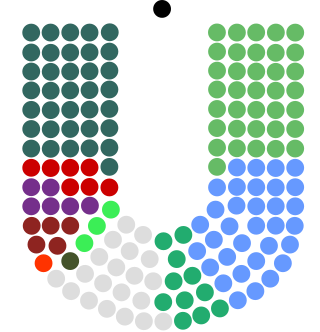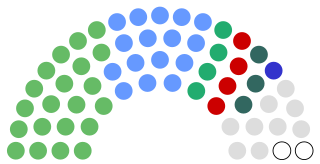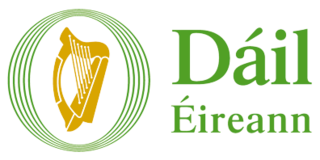Related Research Articles

The Oireachtas, sometimes referred to as Oireachtas Éireann, is the bicameral parliament of Ireland. The Oireachtas consists of the president of Ireland and the two houses of the Oireachtas, a house of representatives called Dáil Éireann and a senate called Seanad Éireann.

The Constitution of Ireland vests executive authority in the Government of Ireland, which is headed by the Taoiseach, the head of government. The government – also known as the cabinet – is composed of ministers, each of whom must be a member of the Oireachtas, which consists of Dáil Éireann and Seanad Éireann. Most ministers have a portfolio of specific responsibilities such as departments or policy areas, although ministers without portfolio can be appointed.

The Minister for the Co-ordination of Defensive Measures was the title of Frank Aiken as a member of the Government of Ireland from 8 September 1939 to 18 June 1945 during The Emergency — the state of emergency in operation in Ireland during World War II. The Minister was intended to handle Civil Defence and related measures, allowing the Minister for Defence to concentrate on matters relating to the regular Army. The office was also responsible for handling wartime censorship.
This is a list of records relating to the Oireachtas, the national parliament of Ireland, which consists of the President of Ireland, and two Houses, Dáil Éireann, a house of representatives whose members are known as Teachtaí Dála or TDs, and Seanad Éireann, a senate whose members are known as senators.

Mark Daly is an Irish Fianna Fáil politician who has served as Leas-Chathaoirleach of Seanad Éireann since December 2022. He previously served as Cathaoirleach of Seanad Éireann from June 2020 to December 2022. He has served as a Senator for the Administrative Panel since July 2007.

Seanad Éireann is the upper house of the Oireachtas, which also comprises the President of Ireland and Dáil Éireann.
Maev-Ann Wren is an Irish economist, journalist, author, and former special advisor to the Minister of State at the Department of Health, Roisin Shortall. She is the former economics editor of The Irish Times newspaper. Wren has written two books about the Irish health system and her writings have often been mentioned during Dáil and Seanad debates, and in parliamentary committee. She has been described in the Seanad as "a recognised expert on health care."

Simon Harris is an Irish politician who has served as leader of Fine Gael since 2024. Harris has been a minister in the government of Ireland since 2016, serving as Minister for Further and Higher Education, Research, Innovation and Science since June 2020. He has been a Teachta Dála (TD) for the Wicklow constituency since 2011 and was a Minister of State from 2014 to 2016.

Hildegarde Naughton is an Irish Fine Gael politician who has served as Government Chief Whip and Minister of State at the Department of Health since December 2022, and as a Minister of State attending cabinet since June 2020. She has been a Teachta Dála (TD) for the Galway West constituency since 2016. She previously served as Chair of the Committee on Communications, Climate Action and the Environment from 2016 to 2020 and Mayor of Galway from 2011 to 2012. She also served as a Senator from 2013 to 2016, after being nominated by the Taoiseach.

Dáil Éireann is the lower house, and principal chamber, of the Oireachtas, which also includes the president of Ireland and a senate called Seanad Éireann. It consists of 160 members, each known as a Teachta Dála. TDs represent 39 constituencies and are directly elected for terms not exceeding five years, on the system of proportional representation by means of the single transferable vote (PR-STV). Its powers are similar to those of lower houses under many other bicameral parliamentary systems and it is by far the dominant branch of the Oireachtas. Subject to the limits imposed by the Constitution of Ireland, it has power to pass any law it wishes, and to nominate and remove the Taoiseach. Since 1922, it has met in Leinster House in Dublin.
The Citizens' Assembly is a citizens' assembly established in Ireland in 2016 to consider several political questions including the Constitution of Ireland. Questions considered include: abortion, fixed term parliaments, referendums, population ageing, and climate change. Over 18 months a report is produced on each topic. The government is required to respond officially to the reports in the Oireachtas (parliament); as of 9 April 2019 responses have been given on three of the five topics.
The 26th Seanad has been in office since 2020. The 2020 Seanad election followed the 2020 general election to the 33rd Dáil on 8 February. The Constitution of Ireland required a general election for Seanad Éireann, the Senate of the Oireachtas, to take place not later than ninety days after a dissolution of 32nd Dáil on 14 January 2020. There are 60 seats in the Seanad: 43 were elected on five vocational panels by serving politicians, for which polling closed on 30 March 2020; 6 were elected in two university constituencies, for which polling closed on 31 March 2020; and 11 were nominated by the Taoiseach on 27 June 2020.

The Health Act 2020 was an Act of the Oireachtas which provided for additional powers for the state in the extraordinary circumstances of the spread of the COVID-19 pandemic.
The National Public Health Emergency Team for COVID-19 (NPHET) was a National Public Health Emergency Team within Ireland's Department of Health that oversaw and provided national direction, support, guidance and expert advice on developing and implementing a strategy to control the coronavirus disease 2019 (COVID-19) pandemic in Ireland.
The Emergency Measures in the Public Interest (COVID-19) Act 2020 was an Act of the Oireachtas which provided for additional powers for the state in the extraordinary circumstances of the spread of the COVID-19 pandemic.

The COVID-19 pandemic has impacted and affected the political system of the Republic of Ireland, causing suspensions of legislative activities and isolation of multiple politicians due to fears of spreading the virus. Several politicians have tested positive for COVID-19 in 2020, 2021 and 2022.
The Minister of State at the Department of Health is a junior ministerial post in the Department of Health of the Government of Ireland who may perform functions delegated by the Minister for Health. A Minister of State does not hold cabinet rank.
The Minister of State at the Department of Transport is a junior ministerial post in the Department of Transport of the Government of Ireland who may perform functions delegated by the Minister for Transport. A Minister of State does not hold cabinet rank.

Committees of the Oireachtas are committees and sub-committees and select committees of Dáil Éireann and Joint Committees of Dáil Éireann and Seanad Éireann, that are small groups of TDs and senators of the Oireachtas, the parliament of the Republic of Ireland. Some committees are formed by statute after every general election, others are formed by agreement for a full parliamentary term or for a specific issue on a time-limited basis. Committees are formed on a proportional basis from members of the political parties/groups in each house. Chairs of committees are granted a stipend for their work. Some committees scrutinise the work and proposed legislation from specific government departments, and senior ministers or junior ministers of state as well as public servants or representatives of semi-state bodies and organisations supported by state funding are also regularly invited to address such committees.
References
- ↑ "The National Public Health Emergency Team (NPHET) for COVID-19 was established on 27th January 2020 in the Department of Health". Gov.ie. Retrieved 7 July 2020.
- ↑ Ryan, Philip (5 April 2020). "Inside the all-powerful coronavirus taskforce - Ireland's decision-makers in a crisis: Our new rulers during this health crisis are a crack team of doctors, scientists and senior civil servants". Sunday Independent . p. 12.
- 1 2 "Control of Infectious Diseases - Dáil Éireann Debate, Wednesday - 17 October 2007". Houses of the Oireachtas . 17 October 2007. Retrieved 17 June 2021.
- 1 2 3 "Seanad Éireann debate - Wednesday, 6 May 2009". Houses of the Oireachtas . 6 May 2009. Retrieved 17 June 2021.
- ↑ "18 new superbug cases confirmed as public health emergency enters fifth month". Irish Examiner. 22 February 2018. Retrieved 17 June 2021.
- ↑ "Minister for Health convenes the National Public Health Emergency Team as a public health response to the CPE superbug". merrionstreet.ie. Merrion Street. 25 October 2017. Retrieved 17 June 2021.
- ↑ "Hospital Acquired Infections - Dáil Éireann Debate, Wednesday - 8 November 2017". Houses of the Oireachtas . 8 November 2017. Retrieved 17 June 2021.
- ↑ "Minutes of National Public Health Emergency Team (NPHET) Meetings 2019". Department of Health. 12 April 2019. Retrieved 9 April 2020.
- ↑ Reilly, Catherine (25 March 2019). "Department considers ending CPE public health emergency". The Medical Independent. Retrieved 17 June 2021.
- ↑ Boland, Rosita (3 April 2020). "Covid-19 jargon buster: What are 'the curve', R0 and the NPHET?". The Irish Times . Retrieved 6 April 2020.
- ↑ Lehane, Micheál (22 February 2022). "Govt agrees to end almost all Covid measures". RTÉ News and Current Affairs . Retrieved 22 February 2022.
- ↑ "Minister reveals members of new Covid-19 advisory group". RTÉ News and Current Affairs. 8 April 2022. Retrieved 8 April 2022.